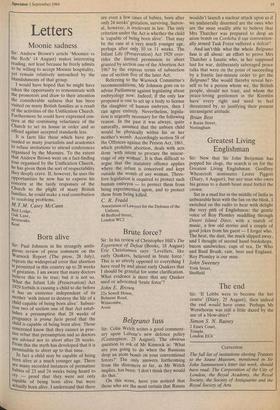Born alive
Sir: Paul Johnson in his strangely ambi- guous review of press comment on the Warnock Report (The press, 28 July), repeats the widespread error that abortion is permitted in this country up to 28 weeks of gestation. I am aware that many doctors believe this to be true; but it is not so. What the Infant Life (Preservation) Act 1929 forbids is causing a child to die before it has an existence independent of its Mother 'with intent to destroy the life of a Child capable of being born alive'. Subsec- tion two of section one of that Act estab- lishes a presumption that 28 weeks of Pregnancy is prima facie proof that the Child is capable of being born alive. Those c!oncerned know that they cannot in prac- tice rebut that presumption and so doctors are advised not to abort after 28 weeks. From this the myth has developed that it is Permissible to abort up to that time.
In fact a child may be capable of being born alive at a much younger age. There are many recorded instances of premature babies of 23 and 24 weeks being heard to cry — proof that they were not only capable of being born alive but were actually born alive. I understand that there are even a few cases of babies, born after only 24 weeks' gestation, surviving. Surviv- al, however, is irrelevant in law. The only criterion under the Act is whether the child is 'capable of being born alive'. That may be the case at a very much younger age, perhaps after only 10 or 11 weeks. The Infant Life (Preservation) Act 1929 over- rides the limited permission to abort granted by section one of the Abortion Act 1967 by the express terms of subsection one of section five of the later Act.
Referring to the Warnock Committee's recommendations, Mr Johnson goes on to advise Parliament against legislating about embryology now. Indeed, if the only law proposed is one to set up a body to license the slaughter of human embryos, then I can agree entirely. Nevertheless, legisla- tion is urgently necessary for the following reason. In the past it was always, quite naturally, assumed that the unborn child would be physically within his or her mother's womb. Accordingly section 58 of the Offences against the Person Act, 1861, which prohibits abortion, deals with acts done 'with intent to procure the miscar- riage of any woMan'. It is thus difficult to argue that the statutory offence applies where the infant is conceived and kept outside the womb of any woman. There- fore legislation is required to protect such human embryos — to protect them from bring experimented upon, and to protect them from being killed.
C. R. Fradd
Association of Lawyers for the Defence of the Unborn, 40 Bedford Street, London WC2










































 Previous page
Previous page